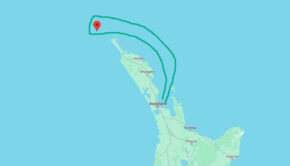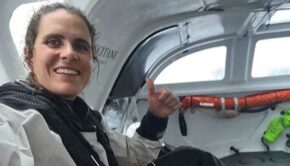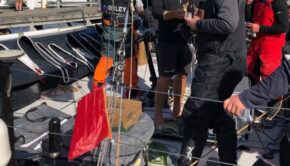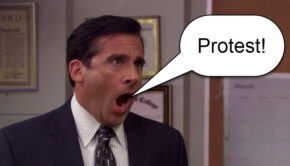Redress at the start: When should it be given?
Published on March 6th, 2014
The opening of the 87th Star BACARDI Cup on Monday struggled to start the highly competitive and aggressive fleet of 54 boats, requiring the use the black flag rule. Seven teams were disqualified, including event favorite Paul Cayard. Though Paul was successful in his redress hearing, Tom Donlan isn’t so sure that was the proper decision…
Paul Cayard recounted his request for redress after being disqualified in a black flag start….
“The international Jury conducted a hearing in which I was allowed to present my case including photos and a witness. I was allowed to question the Race Committee representative who called out. The race committee official was very honest and unbiased in his testimony.
“The facts found were that person calling the line from the left side had lost sight of the starting line for at least the last three seconds prior to the start. Some boats were over the line at the right hand end, obscuring the line from the left hand end. According to the tape recording of the communications onboard the race committee boat, our boat was identified less than a second before the start. We were near the middle of the line.
“Without being able to see the starting line, there was reasonable doubt as to whether or not we were over the line and the jury decided than the benefit of doubt should go to the competitor and redress should be given.”
It sounds as though everyone involved did the best job they could under the circumstances, under the rules, and under the common practice in such situations. But there’s a problem here.
When several boats in a large fleet are over the line in the last few seconds before the start, the line callers nearly always lose sight of the other end of the line. Their best resort is to hold a hand-bearing compass on the bearing to the other end of the line, but even when they do so, calling the last few boats over before the start is still a judgment call. It’s not easy to read a compass at arm’s length and sail numbers 500 feet away.
“Reasonable doubt” is not hard to establish, especially when tape recordings show – as they almost always do- that there was tension and uncertainty aboard the line-caller’s boat and that one or more boats were called OCS at the last second. We can’t be sure that the yacht seeking redress was over early.
However, we can be sure that at least one person had less certainty about the location of the line than the line-caller: A skipper halfway down the line will have lost sight of the line much sooner than the line-caller. He may believe he was not over early, but he probably can’t see either end of the line in the last 10 seconds from his position toward the back of the boat. He really can’t know the truth within a boat-length, no matter how many years of experience in world-class racing he may have, no matter how well he presents his case.
I believe the jury should rely on the line-caller and not give any competitor the benefit of reasonable doubt, even if the doubt really was reasonable. Redress should not be given unless evidence, preferably photographic, establishes, beyond a reasonable doubt, that the disqualified boat was not OCS. I’d go further: The rules, or at least the Sailing Instructions in major events, should not allow requests for redress by boats called OCS.
Or we might never use draconian starting penalties. Or we might all learn to do rabbit starts like the 505 class.









 We’ll keep your information safe.
We’ll keep your information safe.